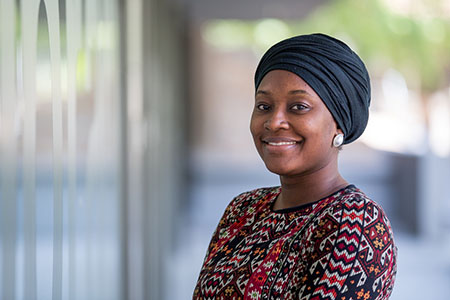Blog
A summer of learning
Takeaways from the first UNU-WIDER Summer School
As an applied economist working as a lecturer and researcher in Nigeria, opportunities to learn and exchange ideas with peers can be few and far between. Researchers in the Global South, like myself, are often quite isolated with limited opportunities to engage with researchers at the top of our field. Our institutes are commonly under-resourced and often lack access to the latest analysis tools and methodologies to allow us to carry out high-quality research on the issues in our countries. However, this seems to be changing as programmes like the UNU-WIDER Summer School fill the knowledge gap by bringing experts from top institutions around the world to equip young, developing country researchers with skills from the cutting edge of applied economics.

The 2019 summer school — held at the University of Cape Town, South Africa — facilitated learning between young researchers and leading experts. I was lucky enough to be part of the two-week intensive course which was undoubtedly a career highlight. This life-changing opportunity provided me with practical skills to engage in policy-relevant research, a new network, and a great sense of excitement for the high-impact research that can be achieved by researchers in the Global South.
The programme promised that the experience was going to be rigorous and intense, and it was! There was so much to learn and so many resources to pore over. We started with an intensive Stata session, a much-needed refresher. Then we went into two weeks of morning classroom sessions where we learned the theoretical aspect of the course and afternoon lab sessions where we got our hands dirty working with datasets to apply our knowledge. The structure of the course made it easy for me to understand the concepts of labour markets, poverty, and inequality and taught me how best to analyse the datasets and transfer that knowledge to my own research.
In my application I was asked to submit a research proposal — I sent through something that I had just begun working on, household debt, poverty, and inequality in Nigeria — with the idea that the summer school could be a good opportunity to get feedback and to develop my ideas further. During the summer school I did get that chance, I presented my research to the other participants and the lecturers and received feedback that helped me to better conceptualise my idea, but the best part was being able to work on my proposal in the lab, applying newly acquired skills with the support of the summer school research team, helping me to think through my research idea and develop my idea into a research proposal that would be policy-relevant and impactful.
All the lecturers were fantastic. Carlos Gradín’s lecture on the concept and measurement of inequality, poverty, and employment and Sergio Firpo’s lecture on regression-based decomposition techniques, gave me insights into new research areas I could explore. While Costanza Biavaschi’s and Patrizio Piraino’s lectures helped clarify my thoughts on the relevant analytical tools I could use to answer my research questions. But a highlight for me was Gary Fields’ introductory lecture on labour markets in developing countries. Gary is a top labour economist at Cornell University and a fantastic lecturer, and it was an honour and a pleasure to learn from him. He really broke down the theory of labour markets, helping us to understand why it is such an important aspect of economic research, and left us with a toolkit, A Five-Part Policy Evaluation Framework, to help us think through our policy questions and make them relevant for policymakers.
The summer school was definitely time well spent. I was lucky enough to share my experience with a group of nineteen other participants from various countries around the Global South, creating a network of like-minded researchers who I will be able to call on in years to come for feedback, collaboration, and support. Our common goal of doing relevant development economics research in our various country contexts and our shared experience at the summer school is already beginning to foster exciting collaboration opportunities.
And it isn’t just the twenty summer school participants who will benefit from the experience — I hope to get more people involved in high-level development economics research by sharing the knowledge I gained during the summer school with my students and fellow researchers in my institution. This is just the beginning, and I look forward to being part of a future full of high-impact development research being done by researchers from, and in, developing countries.
Without hesitation I can say that it has been a privilege to be part of the UNU-WIDER Summer School, becoming part of the UNU-WIDER network, meeting like-minded researchers from around the Global South, and most of all, because I am now confident I am well equipped to participate in discussions that involve the development of my country’s (and other developing countries’) economies.
Khadijat Busola Amolegbe is a lecturer at the Department of Agricultural Economics and Farm Management, University of Ilorin, Nigeria.
The views expressed in this piece are those of the author(s), and do not necessarily reflect the views of the Institute or the United Nations University, nor the programme/project donors.
 Join the network
Join the network
